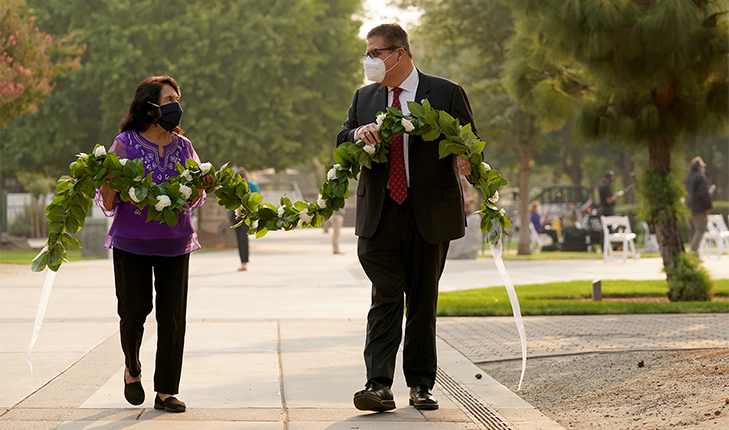In a small physically distanced ceremony, about two dozen people gathered as Fresno State joined the California State University system in honoring the far-reaching legacy of labor leader and civil rights activist Dolores Huerta with a tree-planting ceremony in the Peace Garden on campus.
The CSU Board of Trustees passed a resolution in April of this year, on the occasion of Huerta’s 90th birthday. Each of the 23 campuses in the CSU system will pay tribute to her by planting a tree or by taking other appropriate commemorative action to honor her lifelong work in service to California and Californians.
For the event at Fresno State, a ginkgo tree was planted next to the statue of César Chávez, with whom Huerta spent many years advocating for the rights of and improved working conditions for farmworkers.
“As an iconic activist for social justice, Ms. Huerta has proven herself a resolute champion of labor rights, immigrant rights, civil rights, environmental rights, women’s rights and LGBTQ rights,” said Dr. Joseph I. Castro, Fresno State president and chancellor-select for the California State University. “Ms. Huerta has also long been a champion of access to higher education and the catalytic opportunities that California State University provides to individuals and families across the state and beyond. As an influential and respected voice for the transformative power of a college degree, she is an uncompromising advocate for equity in education.”
Those in attendance applauded when during her remarks, Huerta noted that this was her first public appearance since the beginning of March due to the pandemic.
In referencing Castro’s recent appointment as chancellor-select, Huerta noted how many leaders come out of the San Joaquin Valley.
“We know that we here in the San Joaquin Valley — and I say San Joaquin Valley because I’m from Stockton, California — we know that we have a lot to offer the world. Not only the food that people are picking and growing every day, but we have had so much leadership that has come out of the Valley.”
She told of once when she and four other people were in a room waiting to meet with the Dalai Lama, and four out of the five people in the room, “we were all from the San Joaquin Valley. That really shows that we have a lot to offer.”
Huerta said she was thrilled to be recognized by having a tree in her name planted in the Peace Garden.
Dr. Sudarshan Kapoor, professor emeritus of social work education and peace and conflict studies, called Huerta a “living legend of our times” and noted that she has been arrested 22 times during her lifetime of nonviolent protests and acts of civil disobedience.
“She has dedicated her whole life for the rights and improvement of social and economic conditions of farmworkers … She still continues her struggles and battles even at this stage of her life. She never stops. She never gives up — a lesson that I have learned from you, Dolores.”
Huerta, Castro and Kapoor tipped shovelfuls of dirt into the hole around the base of the young tree, located between the Chávez statue and the Native Plant Garden.
The event also celebrated the 30th anniversary of the University’s Peace Garden — established as a student-led initiative in support of peace and nonviolent activism — and the 151st birthday of Mahatma Gandhi, the first peacemaker honored with a statue in the garden.
The statues erected in the Peace Garden over the years are tributes to a diverse group of individuals who dedicated their lives in the pursuit of equality, social change and justice through peaceful methods. In addition to Gandhi, other statues honor the Rev. Dr. Martin Luther King Jr., César Chávez and Jane Addams.
Student speakers read quotes from those honored in the garden. As they did, community members in attendance laid bouquets of flowers on the statues. For the Gandhi bust, Huerta and Castro put a floral garland at the base of the statue.





